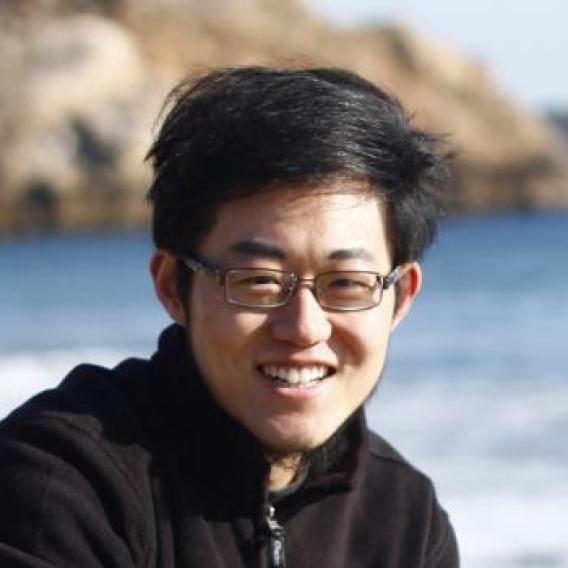Event Details:

Join the speaker for coffee, cookies, and conversation before the talk, starting at 11:45am.
From Light to Sound: Breaking the limits in photoacoustic imaging and bioprinting
Abstract
Photoacoustic imaging (PAI) has become an increasingly popular technique for multi-scale anatomical, functional, and molecular imaging by acoustically detecting the optical absorption contrast in biological tissues. I will focus on several technological advancements in PAI that have enabled a broad range of biomedical applications in life sciences. First, PAI has overcome the penetration limit by utilizing separated light delivery and ultrasound detection, allowing for deep-tissue imaging at clinically relevant depths in large animal models and potentially humans. Second, innovative scanning technologies and deep-learning models have significantly accelerated microscopic PAI by 1000-times with a large field of view. This speed-up facilitates the monitoring of highly dynamic or motion-prone processes, such as functional brain activities, placenta development, and glassfrog transparency. Third, using novel fabrication technologies in optics, acoustics, and electronics, we have developed handheld, wearable, and head-mounted PAI devices that offers high throughput, flexibility and accessibility, providing real-time feedback in awake or free-moving animals and humans. Lastly, by incorporating genetically-encoded photoacoustic probes with photoswitching capability, we have improved the detection sensitivity and specificity of molecular PAI by more than 1000 times, enabling highly-reliable imaging of malignant cancer, tissue hypoxia, and neuronal activities. Meanwhile, we have recently developed a deep-penetration ultrasound volumetric printing technology, overcoming the penetration limit of light-induced cross-linking, allowing for through-tissue construction of complex 3D structures inside the heart, liver, and bone.
Keywords: Photoacoustic imaging, deep imaging, high-speed imaging, molecular imaging, bioprinting, focused ultrasound
Short summary: Enabling technological advancements in photoacoustic imaging and bioprinting allow for a broad range of applications in life sciences and clinical practice.
Junjie Yao, PhD
Duke University
Dr. Junjie Yao is an Associate Professor of Biomedical Engineering at Duke University, with a secondary appointment at Duke Neurology. He is the director of Biophotonics Program at Fitzpatrick Institute for Photonics. He is also affiliated with the Duke Cancer Institute and Duke Institute of Brain Sciences. Dr. Yao earned his B.S. (2006) and M.S. (2008) degrees in Biomedical Engineering from Tsinghua University in Beijing, China. He further pursued his Ph.D. in Biomedical Engineering at Washington University in St. Louis, and completed his doctoral studies in 2013 and postdoctoral training in 2016, both under the mentorship of Dr. Lihong V. Wang.
Since joining Duke University in 2016, Dr. Yao's research has focused on the development of photoacoustic tomography (PAT), ultrasound imaging, and ultrasound bioprinting technologies for applications in the life sciences. His pioneering work involves the integration of light and sound to enable high-speed functional brain imaging, deep-tissue molecular imaging, early-stage cancer detection, and through-tissue ultrasound printing. Dr. Yao’s research have been supported by grants from organizations such as the National Institutes of Health (NIH), National Science Foundation (NSF), American Heart Association (AHA), and Chan Zuckerberg Initiative (CZI).
Dr. Yao's contributions to the field of biomedical engineering have been recognized with several notable awards, including the 2019 IEEE Photonic Society Young Investigator Award, the 2021 National Jewish Fund Faculty Fellowship, the 2022 NSF CAREER Award, and the 2023 Rising Stars of Light Award. In 2023, Dr. Yao was elected as a Fellow of OPTICA (formerly OSA) and Senior Member of SPIE ‘for breaking the limits of photoacoustic imaging in resolution, speed, and functionality, and translating the technical innovations to theragnostic impacts’.
Hosted by - Guosong Hong (Hong Lab, view PI below)
Sign up to interact with the speaker
Engagement with our seminar speakers extends beyond the lecture. On seminar days, invited speakers meet one-on-one with faculty members, have lunch with a small group of trainees, and enjoy dinner with a small group of faculty and the speaker's host.
If you’re a Stanford faculty member or trainee interested in participating in these interaction opportunities, click the button below to express your interest. Depending on availability, you may be invited to join the speaker for one of these enriching experiences.
Interaction Opportunities Interest Form
About the Wu Tsai Neurosciences Seminar Series
The Wu Tsai Neurosciences Institute seminar series brings together the Stanford neuroscience community to discuss cutting-edge, cross-disciplinary brain research, from biochemistry to behavior and beyond.
Topics include new discoveries in fundamental neurobiology; advances in human and translational neuroscience; insights from computational and theoretical neuroscience; and the development of novel research technologies and neuro-engineering breakthroughs.
Unless otherwise noted, seminars are held Thursdays at 12:00 noon PT.
Questions? Contact neuroscience@stanford.edu
Sign up to learn about all our upcoming events
